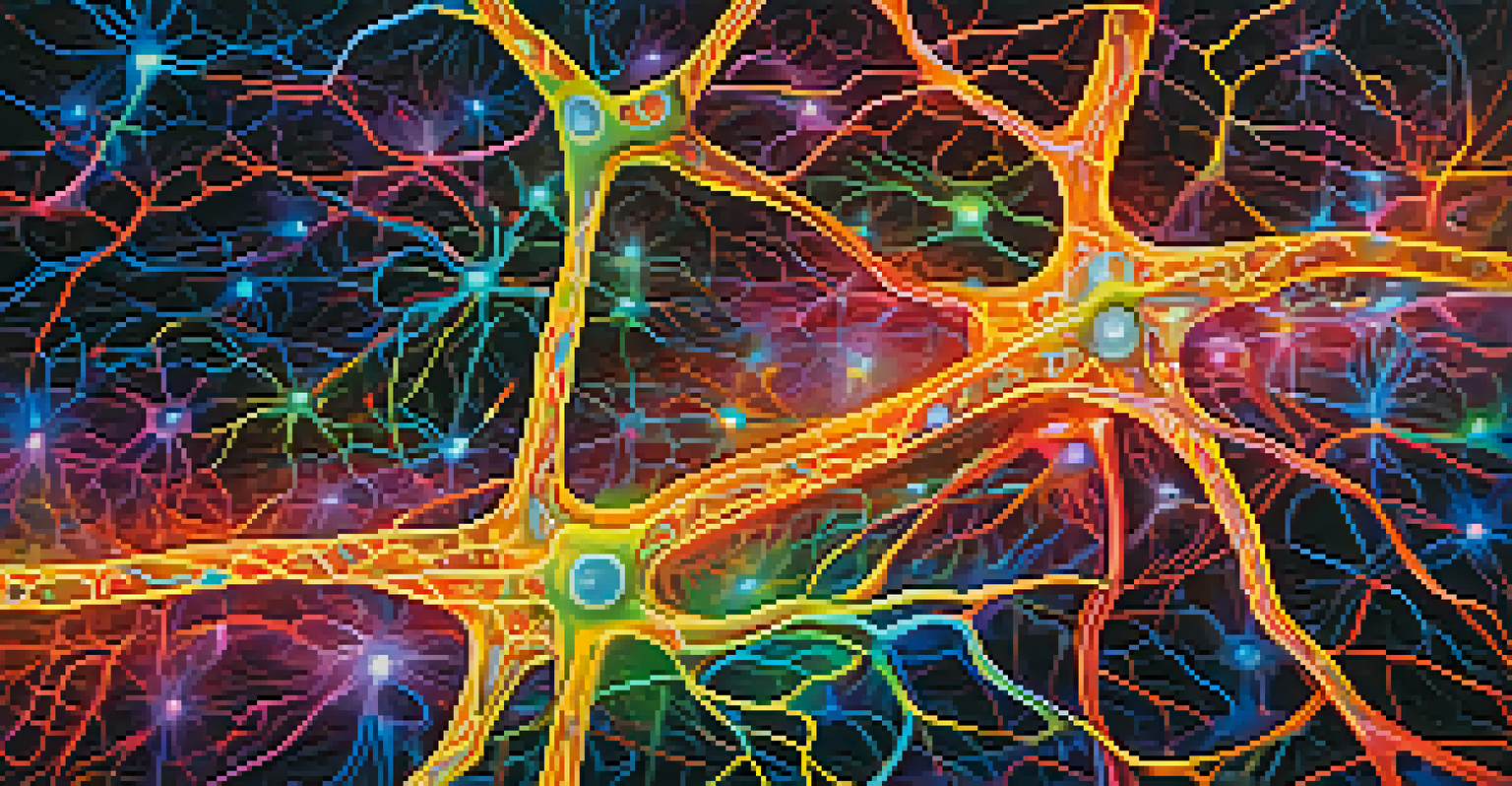The Science Behind Entheogens and Their Meaningful Effects

Understanding Entheogens: A Quick Overview
Entheogens are substances that have been used for centuries in various cultures for spiritual and therapeutic purposes. Common examples include psilocybin mushrooms and ayahuasca, which can induce altered states of consciousness. These experiences often lead to profound insights and personal growth, making them a focal point for both scientific research and spiritual exploration.
The experience of altered states of consciousness can lead to profound insights and personal growth.
The term 'entheogen' comes from the Greek words meaning 'generating the divine within.' This highlights their historical role in fostering spiritual experiences. While often associated with shamanistic practices, many modern users seek entheogens for self-discovery and healing.
As the interest in mental health and alternative therapies grows, entheogens are being studied more rigorously. Researchers are beginning to uncover the psychological and neurological impacts of these substances, shedding light on why they can lead to such meaningful experiences.
The Neuroscience of Altered States
When we consume entheogens, they interact with our brain's receptors, particularly the serotonin receptors. This interaction can lead to changes in perception, mood, and thought processes. For instance, psilocybin, the active compound in magic mushrooms, has been shown to promote neuroplasticity, which is the brain's ability to adapt and reorganize itself.

Research has shown that during entheogenic experiences, individuals often report a feeling of connectedness, both to themselves and the universe. This feeling can be attributed to increased brain connectivity, where different regions communicate more freely than usual. This phenomenon can lead to new insights and a sense of unity that many find transformative.
Entheogens Enhance Personal Growth
Substances like psilocybin and ayahuasca promote profound insights and emotional healing, contributing to self-discovery.
Interestingly, studies have indicated that these experiences can lead to lasting changes in attitudes and behaviors. For example, participants in psilocybin studies reported decreased anxiety and improved emotional well-being long after the experience itself, suggesting that the effects extend far beyond the initial trip.
Cultural Significance of Entheogens
Throughout history, many cultures have used entheogens in rituals and healing practices. Indigenous tribes in the Amazon, for instance, have employed ayahuasca as a sacrament for centuries, believing it connects them to spiritual realms. These practices are not just about the substance but the community and context in which they are used.
Entheogens can facilitate profound emotional breakthroughs, allowing individuals to confront difficult emotions and experiences.
In modern society, there is a growing recognition of the importance of setting and intention in using entheogens. The idea of 'set and setting' refers to the mindset of the user and the physical environment during the experience. A supportive environment can enhance the positive aspects of the journey, leading to more meaningful insights.
The resurgence of interest in these substances has sparked discussions about their role in contemporary spirituality and personal growth. People are increasingly seeking out these experiences as a way to explore their inner landscapes and connect with something greater.
Therapeutic Potential of Entheogens
Recent studies have highlighted the potential therapeutic benefits of entheogens for conditions like PTSD, depression, and anxiety. For example, research on psilocybin has shown promising results in aiding patients with treatment-resistant depression, offering a new avenue for those who have struggled with traditional treatments.
Entheogens may also help facilitate profound emotional breakthroughs, allowing individuals to confront difficult emotions and experiences. This therapeutic process can lead to catharsis and healing, making them a valuable tool in psychotherapy.
Therapeutic Uses Are Promising
Research indicates that entheogens may effectively treat conditions such as PTSD and depression, offering new hope for those in need.
However, while the potential is exciting, it's essential to approach these substances with caution and respect. They are not a panacea and should be used under professional guidance, especially in therapeutic settings, to ensure safety and efficacy.
Legal and Ethical Considerations
The legal status of entheogens varies widely across the globe, with some countries embracing their use in therapeutic contexts while others maintain strict prohibitions. This patchwork of legality can create barriers for those seeking to explore their benefits safely and responsibly.
Ethically, there are concerns about cultural appropriation, particularly when Western individuals seek out traditional practices without understanding their cultural significance. It's crucial to respect the origins and traditions associated with these substances to avoid exploitation.
As research progresses and more people advocate for the responsible use of entheogens, discussions around regulation and access will likely continue. Balancing safety, respect for cultural practices, and the potential for healing is essential in navigating this evolving landscape.
Personal Experiences: Stories of Transformation
Many individuals who have engaged with entheogens share transformative stories that reflect their profound personal journeys. These narratives often highlight themes of healing, self-discovery, and connection, illustrating the potential impact of these experiences on one's life.
For instance, someone struggling with grief might find solace and understanding through a guided ayahuasca ceremony, leading to a renewed sense of purpose and emotional release. Such stories resonate deeply, emphasizing the human desire for meaning and healing.
Cultural Context Matters
Understanding the cultural significance and ethical considerations surrounding entheogens is essential for their responsible use.
These personal accounts not only inspire others to explore entheogens but also foster a community of shared experiences. As more people open up about their journeys, it builds a collective understanding of the profound effects these substances can have.
The Future of Entheogens in Society
As research into the benefits of entheogens continues to expand, there is a growing movement advocating for their integration into mainstream medicine and wellness practices. This shift could lead to a broader acceptance and understanding of their potential in various therapeutic contexts.
Moreover, the ongoing dialogue around mental health and holistic approaches opens the door for more individuals to consider entheogens as part of their healing journeys. The combination of scientific validation and personal stories may pave the way for a cultural renaissance regarding these substances.

Ultimately, the future of entheogens in society will depend on continued research, open conversations, and a commitment to responsible use. By embracing their potential while acknowledging the complexities, we can foster a deeper understanding of their role in human experience.